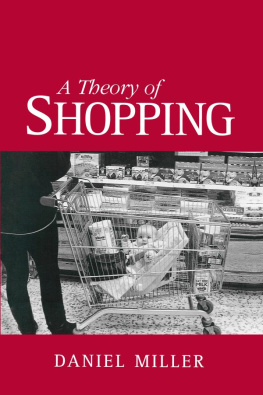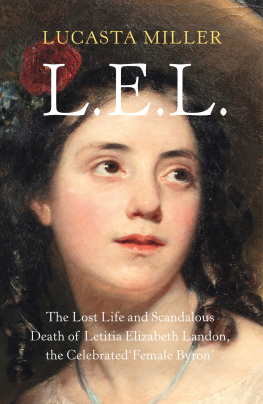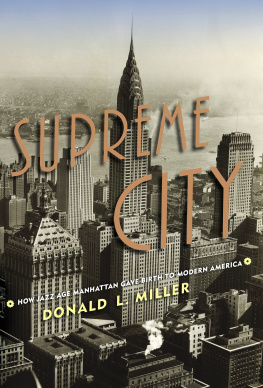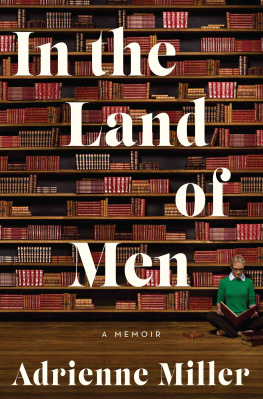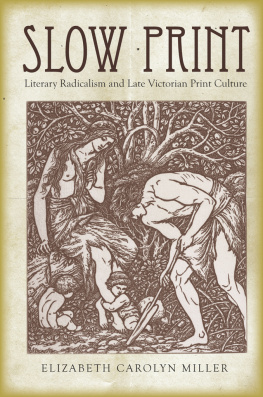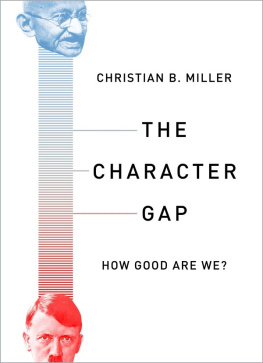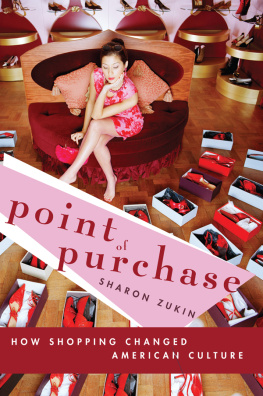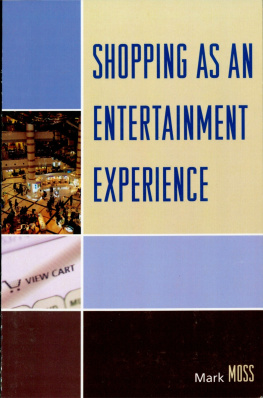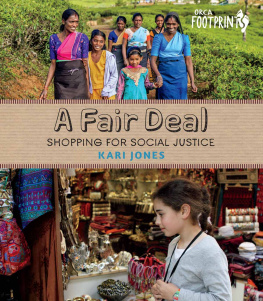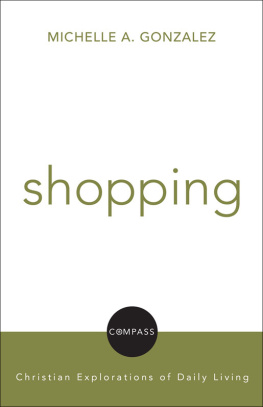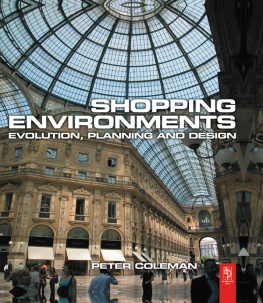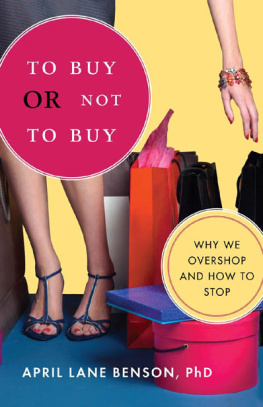To Berenice

A Theory of
Shopping

Daniel Miller
Polity Press
Copyright Daniel Miller 1998
The right of Daniel Miller to be identified as author of this work has been asserted in accordance with the Copyright, Designs and Patents Act 1988.
First published in 1998 by Polity Press in association with Blackwell Publishers Ltd.
Reprinted 2005
Polity Press
65 Bridge Street
Cambridge CB2 1UR, UK
All rights reserved. Except for the quotation of short passages for the purposes of criticism and review, no part of this publication may be reproduced, stored in a retrieval system, or transmitted, in any form or by any means, electronic, mechanical, photocopying, recording or otherwise, without the prior permission of the publisher.
Except in the United States of America, this book is sold subject to the condition that it shall not, by way of trade or otherwise, be lent, re-sold, hired out, or otherwise circulated without the publishers prior consent in any form of binding or cover other than that in which it is published and without a similar condition including this condition being imposed on the subsequent purchaser.
ISBN 0-7456-1945-2
ISBN 0-7456-1946-0 (pbk)
ISBN 9780745667911(eBook)
A CIP catalogue record for this book is available from the British Library.
Typeset in 11 on 13 pt Sabon
by Graphicraft Typesetters Ltd., Hong Kong
Printed and bound in Great Britain by Marston Book Services Limited, Oxford
This book is printed on acid-free paper.
For further information on Polity, visit our website: www.polity.co.uk
Acknowledgements
Writing this book has put me in debt to a great many people. Most of them cannot be named since they are my informants and I have tried as far as possible to retain the anonymity which I promised them. The experience of this research was quite different from any previous fieldwork that I have attempted. Working in other countries I always felt extremely welcome and that I could trade on the exotic nature of my own presence, against the time and information I was asking from others. In North London I am much more likely to be regarded as a mere nuisance requesting time from people who inevitably regard themselves as already extremely busy. I am the more grateful therefore to many people who suffered my presence and attention and gave of their time in a manner I cannot feel sure I would have granted if the roles had been reversed.
The fieldwork would have been a great deal more difficult (and also far less enjoyable) without the companionship of Alison Clarke, especially during the period of initial introduction to each household. Alison is proceeding with her own studies based on this fieldwork, but I can already attest to her abilities as an ethnographer. Her relaxed informality which helped me to deal with the frustrations of fieldwork was also the key to providing access to and in some cases developing friendships with the households we were studying.
This book was not an intended outcome of the ethnography, but developed its own momentum. Quite unlike anything else I have worked on, the manuscript seemed to write itself during the midsummer of 1996. The ideas had been swirling around in my head during and after the fieldwork, but there was one definite catalyst that precipitated crystallization into its present form. This was some conversations with the anthropologist Laura Rival. It was Laura who insisted that I take another look at Bataille, whose work I had previously seen as of little interest, and that I concentrate, in particular, on the way Bataille linked consumption to sacrifice. I am very grateful to her and would note that it was her conversations and inspiration as much as actually reading Bataille that were instrumental in conceiving of this book. I would also acknowledge the value of having the work of DeVault drawn to my attention by Pat Berhu.
Although this essay was conceived outside the larger project, the ethnography upon which it is based was funded as part of my contribution to a research study on Consumption and Identity funded by the Economic and Social Research Council. Finally, several people went out of their way to provide detailed comments on the draft manuscript which have proved very helpful in rewriting this work. These are Colin Campbell, Caroline Humphrey, Laura Rival, Michael Rowlands, Don Slater, Charles Stewart, Nigel Thrift and the anonymous reader for Polity Press, to all of whom I am very grateful. Other useful comments were provided by the postgraduates who form our regular drinking group.
Introduction
This is an essay about shopping. It also an essay about love and devotion within families in North London and it is an essay about the nature of sacrificial ritual. In recent months when people have asked me about the work I am engaged in I have replied that I have written an essay with these three themes. The response has tended to be defensive, often expressing incredulity that an essay could possibly rest secure on the foundations of such an odd trilogy. In return I have been tempted to say that if only they could read the essay they would see why these three topics create a structure with integrity but that I cant hope to be at all convincing while standing chatting with them at a street corner. Here at the start of the essay we the author and reader have to begin with the brevity of the street corner. Although my overall case is made in the essay as a whole, an initial argument may be made in a small compass.
I hope to persuade you to read this work from a position of empathy, rather than defensive scepticism, through asking for a little introspection on your part. This is not an essay about what people say about shopping, nor about the journalism, conversations at parties or jibes and condescending remarks people constantly make about this topic. It is not about your longing for that coveted object or about holiday browsing. It is about the activity you undertake nearly every day in order to obtain goods for those people for whom you are responsible the goods you and they eat, wear and employ in a multitude of tasks. So reflect for a few moments on the shopping you have undertaken in the last week. Routine shopping that is the subject of this essay is rarely exciting and usually soon forgotten. It is largely unreflective. But what does it look like? Although this is of course a hugely diverse activity, what are the typical acts of shopping whose observation led me to create this tripartite edifice?
For present purposes I am hoping you have some experiences in common with people in North London a strong possibility given the diversity of North London people. You are, however, more likely to be an academic or a student. Perhaps you are a junior male lecturer and last week you went shopping for clothes. You went to three shops: two chain stores (C&A and Marks & Spencer) and a small independent, more fashionable outlet. Your girlfriend was complaining about your wearing things she felt you shouldnt be seen dead in. The relationship between the two of you was not such that you were going to admit how attached you had become to the admittedly now well-worn jeans you had on at the time. You are not in the habit of changing during the day, and you tend to meet up after work, so whatever you buy has to do for work also. At work there are two colleagues on the staff who are better at withering sarcasm than writing papers and dont share the same taste as your girlfriend. You can see a couple of pairs in the independent shop that she might approve, but you can just imagine the response at work. But then anyway would she actually like them she might hate them. Maybe you should go with her, but then she isnt going to give a toss for your workmates opinions. OK, it shouldnt really matter very much, and yet it was this that made you spend over an hour between the three shops. And anyway what about yourself your own taste shouldnt you have some say? There was a pair you liked, but to be honest it was just the same as those you were out shopping in order to replace. You got really fed up: why are you wasting time when you could be on line looking at that new website? But you really do care about her, and you know this is just the kind of gesture that could make the difference, show her you really are willing to compromise, to make some commitment to the future sharing of taste. In the end you find a pair in C&A that is a more sober (and frankly a whole lot cheaper) version of the independent shops pair, and just hope she wont notice the label.

